When someone is released from a West Virginia prison, Amber Blankenship meets them with a duffel bag with clothing, hygiene items and food, a list of resources and, most of all, a visible sign that someone cares.
“They have a black trash bag and the clothes they got arrested in — which may not fit any more if they’ve been there a while,” she said. “We give them a ride, ask where’s their safe housing, where are they sleeping tonight. We say, ‘Call me tomorrow’ and let them know that we’re not going to forget them.”
Blankenship is peer reentry program coordinator for the REACH Initiative, an organization founded by the West Virginia Council of Churches to provide resources and advocacy for those reentering the community so their transition may be more successful. In addition to immediate needs like the duffel bags, team members help with long-term challenges like navigating the barriers having a criminal record creates in securing housing, employment and food assistance.
Blankenship can relate to those transitioning out of prison because she’s done it herself. As a child, she dealt with family alcohol problems, divorce and the incarceration of her brother. She was arrested for the first time at age 11. After her mother’s death, she wound up in foster care and began using drugs. She went to prison after stealing a police car from a police barracks.
“I couldn’t stop the self-harm, the drug use, the spiral of trauma and pain,” Blankenship said. “I heard similar stories from 95% of the women I was incarcerated with.”
Your tax-deductible gift helps our journalists report the truth and hold Christian leaders and organizations accountable. Give a gift of $30 or more to The Roys Report this month, and you will receive a copy of “Hurt and Healed by the Church” by Ryan George. To donate, click here.
While at Lakin Correctional Center and Jail in West Columbia, West Virginia, Blankenship attended a weekend event conducted by Kairos, an ecumenical prison ministry structured similarly to The Upper Room’s Walk to Emmaus.
“I told God that if he would heal my broken heart, I would go wherever he wanted me to go, and I have served him every day since,” she said. She even has the word Kairos tattooed on her bicep.
Beverly Sharp, executive director of the REACH Initiative, said that utilizing the formerly incarcerated as reentry coordinators is helpful.
“Reachback means you’ve been incarcerated, come out and succeeded, and you reach back to help the next one come out,” she said. “People who’ve been through it understand what works and what doesn’t.”
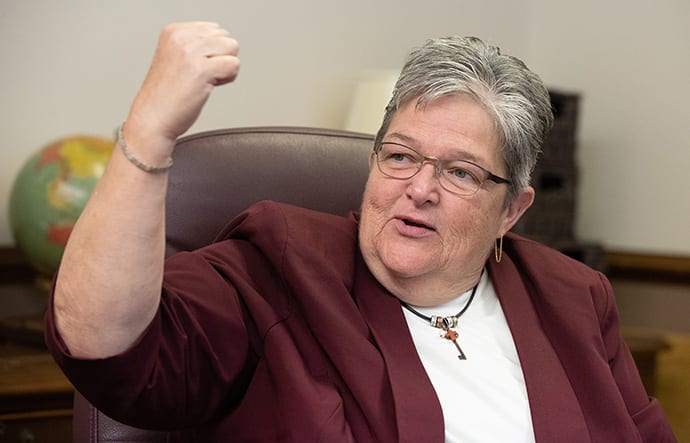
However, conditions of parole often forbid contact with other people who have convictions. Without positive reinforcement, many fall back into the same patterns that landed them in prison.
Aaron Blankenship, Amber’s husband, found himself back in a family household with substance abuse issues after serving a sentence for grand larceny car theft.
“People want better for themselves, but some get steered the wrong direction sometimes,” he said. “I went back to jail and the next time I found a positive community that made all the difference for sustaining that positive change that I’d made in my life.”
He said Kairos was one of those positive communities. “My eyes were opened to what the love of Christ looks like. No judgment. I found myself crying later that night for God to save me.”
Now, he works both as a coordinator with REACH and as a peer recovery support specialist for Southern West Virginia Technical and Community College.
“I love being able to spread hope and healing,” he said. “God has truly taken me from the pit to the palace.”
Not everyone’s reentry has been as successful as the Blankenships’. Just getting a job can be a challenge. In West Virginia alone, there are more than 100 state-issued professional licenses unavailable to a person with a felony conviction — from social work to real estate to cutting hair — and other states have similar laws. These are among the hundreds of collateral consequences that affect those with convictions long after their sentences end.
Sharp describes the layers of potential hazards the formerly incarcerated must navigate, where any misstep could violate their parole and send them back to prison.
She outlines a hypothetical, but common, scenario where a formerly incarcerated person has a scheduled meeting with his parole officer, who lives an hour away. The person lost his license because he couldn’t afford to pay a fine, and there’s not public transportation where he lives. That missed appointment lands the person back in prison, where offenses and fines can compound.
“You walk on eggshells the whole time you’re out,” Sharp said. “We keep piling on punishment and financial penalties that people don’t have the means to pay. I’ve seen people kept in jail because they can’t pay a $100 fine when it costs $50 a day to keep them there.”
After a 30-year career in federal prisons, Sharp said that the system of compounding penalties is ineffective. Now, she advocates for both addressing the root causes of what lands people in prison — such as poverty and substance abuse disorder — and how to give them tools to successfully transition back into society once they get out.
She said nonprofit organizations and the faith-based community can fill a necessary gap if there aren’t reentry programs at the municipal or state level. Faith leaders also can help to “change hearts and minds,” she said, combatting stigma the community may attach to the formerly incarcerated.
“If we don’t mobilize the faith-based community, we’re missing a huge piece of the puzzle for us to address all the needs the state has,” she said.
Sharp has compiled a lengthy list of ways churches can help people going through recovery and reentry. Some ideas include collecting dress clothes for job interviews, recruiting volunteers to help with job hunting and résumé writing, providing transportation for family members to visit incarcerated loved ones, and advocating for policy changes at the local, county or even state level.
The Rev. Jeff Allen, executive director of the West Virginia Council of Churches and a United Methodist pastor, said the church can be a strong advocate because “we can inject mercy into the public debate.”
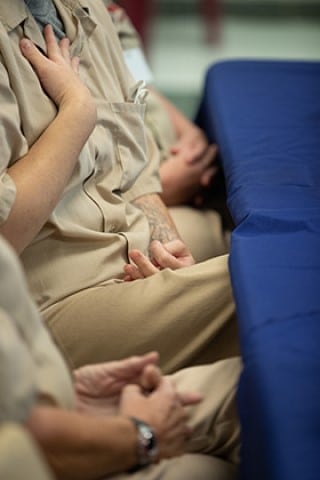
“Caring for those in prison is a foundational calling for the church, right there in Matthew 25,” Allen said. “It should be a primary concern along with hunger and caring for the stranger.”
He said churches should familiarize themselves with the criminal justice systems in their communities. Advocacy for issues like reforming cash bail, restoring voting rights for felons or providing more transitional housing are places that faith leaders can have influence. They can also be a source of emotional support for the formerly incarcerated as they cope with struggles in their transition.
“Beyond visiting those in prison, churches can be intentional about welcoming them into the congregation and wider community when they get out,” he said.
Amber Blankenship said she frequently speaks to the faith-based community about “how to talk to people who are broken, to sit with them and love them because they can’t even love themselves.” She regularly returns to Lakin to minister to the women inmates.
She also is an advocate for identifying children in troubled situations and trying to help.
“Foster care, youth groups, ball teams, schools. There need to be people with eyes on these children before they end up like me,” she said.
Both Aaron and Amber Blankenship point to the benefit of prisons offering educational or vocational training to inmates. Aaron cited the adage that “idle hands are the devil’s playground,” while Amber said such programs can lower recidivism rates.
“The more programs, the more chances a person has to find community and be rehabilitated. If they don’t, they will go back to finding community with a negative influence,” she said. “Ultimately, that costs society more money.”
The Rev. Mike Coleman, a retired United Methodist pastor, former prison warden and current director of the Division of Administrative Services for the West Virginia Department of Homeland Security, said that although one of the goals of corrections rehabilitation is to create better citizens, “society gets the criminal justice system it wants. You’ve got all sorts of belief across the political spectrum.”
The Blankenships said they want to serve as “a light in the world” — both to those trying to turn their lives around and the community that will be receiving them.
“People like myself and my wife who came through the system can now be an example, can maybe change people’s views,” said Aaron Blankenship. “Hopefully more people will get to see how people turn their lives around and become productive citizens again.”
This article originally appeared at UM News.
Joey Butler is a multimedia producer/editor for United Methodist News.




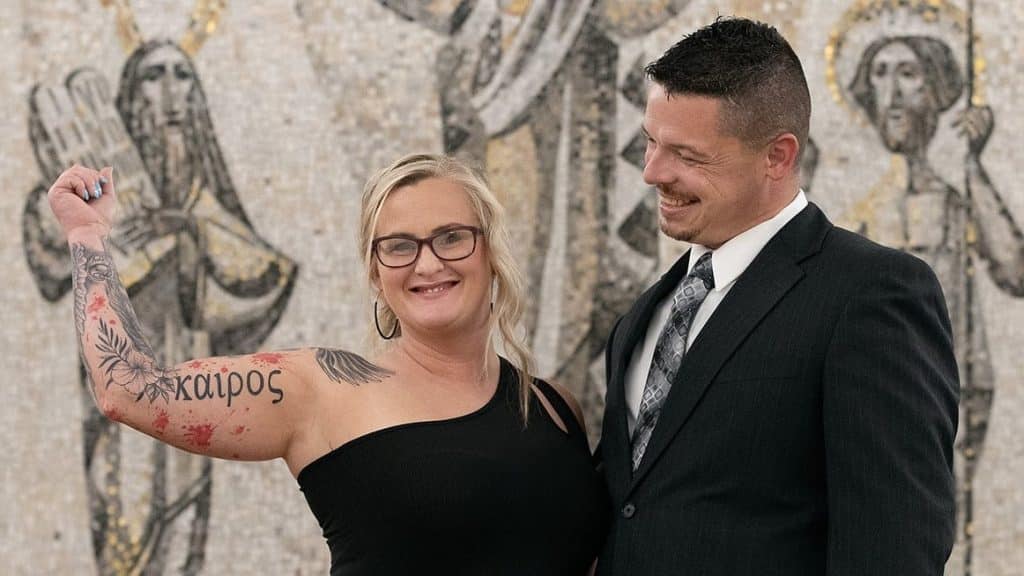

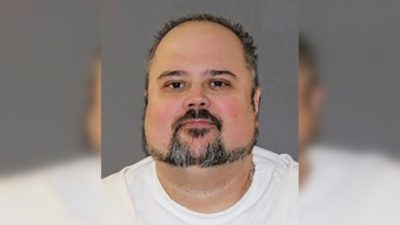
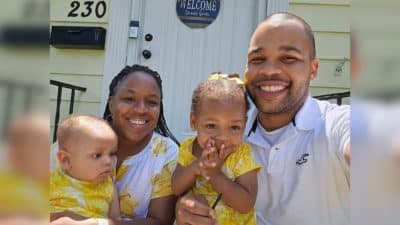

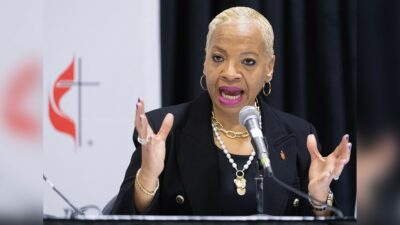










3 Responses
So glad to see stories of redemption like this on The Roys Report. Thank you!
Rev Jeff Allen says: ““we can inject mercy into the public debate.” That is pretty much the most concise formulation of Christian impulse, that I have ever come across. What is being done in these Christian “works”, really appeals and resonates
There is such a need in the prison system. Thank you for sharing this. If you are looking for other prison reentry success stories, I know of a couple outstanding programs in the Kansas City, Kansas area. Brothers in Blue Reentry does an in-prison program and then the men can transition to Firm Foundations and Freedom Initiative Church when they get released.
https://www.brothersinbluereentry.org/
https://www.firmfoundationsministries.org/